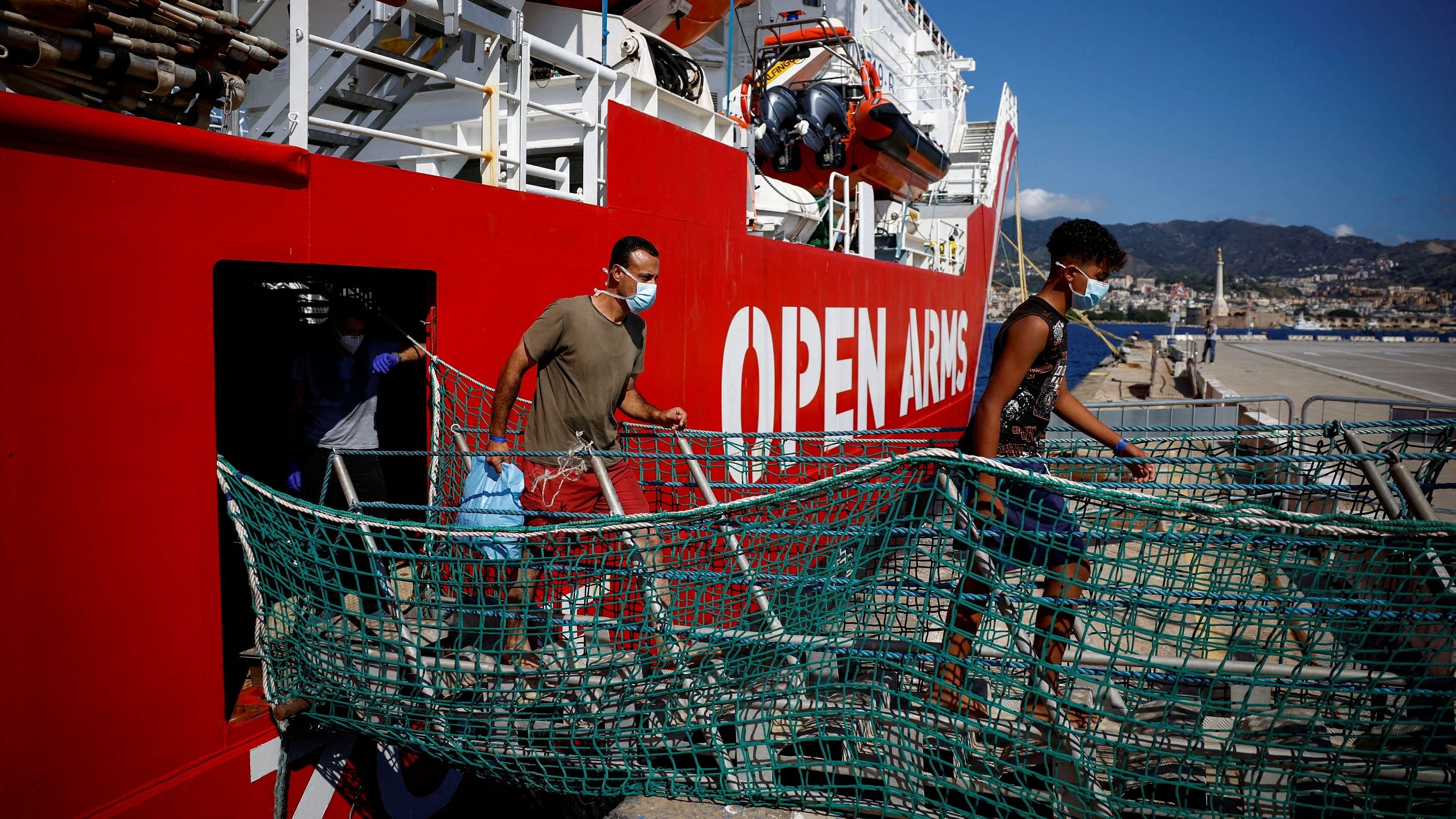
Migrants disembark from Open Arms rescue boat after arriving at Messina port, Sicily, Italy.
Credit: Reuters File Photo
By Rachel Sanderson
Sicily’s tourist hot spots are living an economic boom thanks to shows like HBO’s The White Lotus, which put the island’s breathtaking vistas on display. But the ancient island’s infamous underbelly remains untouched by the influx of new wealth. In fact, organized crime has only diversified and become more entwined with the legitimate economy.
On a recent trip to Sicily, the contrast between the flourishing tourism sector and the declines elsewhere was as stark as I’ve seen in more than 20 years of reporting on the island. In Palermo, the piazza around the cathedral was brimming with activity. Not 10 minutes walk away, burned out cars lined a residential street of dilapidated high-rise apartments. In Taormina, with its Greco-Roman theatre and views over Mt. Etna, locals told me new Louis Vuitton and Prada stores had brought more well-heeled visitors to the hilltop town that has a starring role in the second series of the hit HBO show. Yet down the hill and along the coast, piles of filthy refuse made beaches unusable.
Sicily and organized crime— the island’s Cosa Nostra, have been synonymous since at least the 19th century. Atrocities dwindled in recent years following an aggressive campaign by police in response to the 1992 roadside bombs near Palermo that killed prosecuting magistrates Paolo Borsellino and Giovanni Falcone. But magistrates say it’s also because the Sicilian mafia and its Calabrian counterpart, ndrangheta, have grown more sophisticated, following the money into drugs, prostitution and people trafficking rather than open confrontation with the authorities.
But post-pandemic, there’s a new trend developing that’s a warning for all of Europe. While mobsters continue to follow the money in big cities, they are also feeding on increasing inequality and polarization to undermine the declining and indebted Italian state.
Michele Ricciardi, deputy director and senior researcher at Transcrime, a research institute in Milan, tells me Italy’s traditional split of wealthy north and poor south is now being cut through with a new divide: between its biggest, most successful cities and the rest. In Sicily, this is translating into an economic revival of its picturesque tourist towns, where super wealthy seeking to unlock Italy’s generous tax breaks in exchange for investments are buying up palatial apartments. But outside of these boom areas, there’s “economic, social and cultural degradation,” says Ricciardi.
That degradation, so visible in Palermo’s backstreets, provides the raw material for the organized crime families and networks of Sicily’s Cosa Nostra to step into the breach.
A court case underway in Palermo provides an insight into how gangster tentacles are reaching more subtly, and pervasively, into the social and economic fabric. In the case, 31 business owners from a rundown southeastern area of Brancaccio in Palermo, a short stroll from the buzzy city center, are accused of aiding and abetting mobsters. The accused are on trial for denying having paid protection bribes to Cosa Nostra even though they have been caught on police wiretaps talking about having done so. Local prosecutors say the trial’s so crucial because, they allege— it’s not fear that’s stopping the business owners from admitting the payment of protection money but complicity. In return, they get preferential deals on merchandise, or legal services, or loans, even social services.
Ricciardi from Transcrime says false-invoicing services have become La Cosa Nostra’s killer app. If you’re trying to cut costs to keep your business afloat in a more difficult economic environment, one way is to pay less taxes. That’s where the fake invoices comes in. And the process has become so widespread that “there is a tighter and tighter relationship between tax and financial crime,” he says. Undermining tax collection fuels a vicious circle, as less is available to be invested in already depressed communities, putting them further and further outside the lure to foreign investors and well-heeled tourists, and tying them more closely to the black economy. (Estimates of the size of Italy's black economy vary widely — from some 10 per cent to a third of gross domestic product.)
It’s not just a Sicilian phenomenon. I heard from the same from Alessandra Dolci, one of Italy’s leading anti-mafia prosecutors in Milan. She sees the same widening gulf between the inner city and periphery in Italy’s second city. Dolci insists “to fight organized crime we also need to fight the criminal economy of tax evasion.” Dolci related the story of a mobster who told her he was making more money from his false-invoicing business than drug trafficking. An added bonus, the mobster said, is that it was harder for law enforcement to track the paperwork than the narcotics, Dolci says.
Back in Palermo, Maurizio de Lucia is the chief prosecutor who led the investigations that brought about the arrest of mafia boss Matteo Messina Denaro last year after his 30 years on the run. A killer who boasted his victims could “fill a cemetery," Denaro was considered a godfather like something from a movie, a relic of Italy's traditional mafia of atrocities and terrorism.
But today mafia infiltration has become "a three-legged stool," says De Lucia. It’s more subtle, less violent, and more economically stable. The three legs are the mob and its accomplices in politics and business. He too argues tax avoidance is becoming a major front in the battle against organized crime. The dentist who doesn’t issue an invoice has the same effect as as the drug dealer, he says: “They are both using the same service, they are entering the same terrain.”
It’s a reminder that the darker complexity of picturesque Sicilian idylls isn't just the stuff of big budget fictional shows. But it's real life, and more frightening for that too.